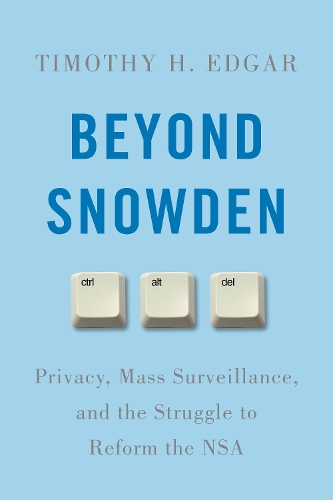
Beyond Snowden: Privacy, Mass Surveillance, and the Struggle to Reform the NSA
(Hardback)
Publishing Details
Beyond Snowden: Privacy, Mass Surveillance, and the Struggle to Reform the NSA
By (Author) Timothy H. Edgar
Bloomsbury Publishing PLC
Brookings Institution
29th August 2017
United States
Classifications
Professional and Scholarly
Non Fiction
Privacy law
Privacy and data protection
327.1273
Physical Properties
Hardback
272
Width 164mm, Height 229mm, Spine 25mm
558g
Description
Safeguarding Our Privacy and Our Values in an Age of Mass Surveillance
Americas mass surveillance programs, once secret, can no longer be ignored. While Edward Snowden began the process in 2013 with his leaks of top secret documents, the Obama administrations own reforms have also helped bring the National Security Agency and its programs of signals intelligence collection out of the shadows. The real question is: What should we do about mass surveillance
Timothy Edgar, a long-time civil liberties activist who worked inside the intelligence community for six years during the Bush and Obama administrations, believes that the NSAs programs are profound threat to the privacy of everyone in the world. At the same time, he argues that mass surveillance programs can be made consistent with democratic values, if we make the hard choices needed to bring transparency, accountability, privacy, and human rights protections into complex programs of intelligence collection. Although the NSA and other agencies already comply with rules intended to prevent them from spying on Americans, Edgar argues that the rulesmost of which date from the 1970sare inadequate for this century. Reforms adopted during the Obama administration are a good first step but, in his view, do not go nearly far enough.
Edgar argues that our communications todayand the national security threats we faceare both global and digital. In the twenty first century, the only way to protect our privacy as Americans is to do a better job of protecting everyones privacy. Beyond Surveillance: Privacy, Mass Surveillance, and the Struggle to Reform the NSA explains both why and how we can do this, without sacrificing the vital intelligence capabilities we need to keep ourselves and our allies safe. If we do, we set a positive example for other nations that must confront challenges like terrorism while preserving human rights. The United States already leads the world in mass surveillance. It can lead the world in mass surveillance reform.
Reviews
Beyond Snowden helps the reader understand the debates between the national security lobby and the civil liberties lobby, and make some constructive suggestions about how to bridge the divide.Financial Times
Edgar, a former ACLU lawyer who left that group in 2006 to advise the director of national intelligence on safeguarding civil liberties and privacy, has the appropriate background to provide this deep dive into the recent history of the American intelligence communitys adoption of mass-surveillance techniques and the ensuing efforts to balance security and freedom. While the general public is familiar with the contours of the issues and the revelations that Edward Snowden provided, Edgar provides an insiders perspective on the governments internal debates.Publisher's Weekly
A former civil rights lawyer considers changing attitudes regarding personal privacy within the National Security Agency following the disclosures by Edward Snowden. Formerly a lawyer for the American Civil Liberties Union and then a civil liberties protection officer for the Director of National Intelligence and the Obama White House, Edgar (International and Public Affairs/Brown Univ.) is well-versed in, and sympathetic to, the concerns of both civil liberties advocates and the national security establishment.Kirkus Reviews
Although Beyond Snowden is modest in length, it is dense with detail and unavoidably complex legal reasoning, particularly in discussing the distinction between NSA treatment of foreign and American communications. Edgar has documented his sources carefully and does his best to present a complicated subject in a clear and succinct manner...This is an important book from a uniquely informed source on a critical and timely topic. It deserves widespread attention.Foreword Review
An expertand laser-focuseddiscussion of electronic intelligence-gathering in the aftermath of an epic security breach.Washington Independent Review of Books
Many books discuss privacy and surveillance policies, how policies are made, and how they should be improved, but this book discusses them from the inside. The author provides anecdotal stories of how his positions have influenced and changed privacy policy, leading to more disclosure of what the government collects and for what purposes. . . . By discussing how the intelligence gathering agencies and the FISA court work, the author interweaves historical items with personal intelligence and anecdotes for a compelling read. Recommended.CHOICE
Author Bio
Timothy H. Edgar defended privacy after 9/11 as a lawyer for the American Civil Liberties Union before going inside America's growing surveillance state as the deputy for civil liberties in the Office of the Director of National Intelligencea story he tells in Beyond Snowden: Privacy, Mass Surveillance and the Struggle to Reform the NSA. Edgar then moved to the White House to advise the National Security Council on cybersecurity policy, in a job that President Barack Obama announced in 2009 that was specifically dedicated to safeguarding the privacy and civil liberties of the American people.
In 2013, Edgar left government for Brown University, where he is a Senior Fellow at the Watson Institute for International and Public Affairs. Edgar helped put together Brown's Executive Master in Cybersecurity and is on the advisory board of Virtru, an encryption software company. Edgar is a contributing editor to Lawfare and his work has appeared in the Wall Street Journal, the Los Angeles Times, the Guardian, Foreign Affairs, and Wired. Edgar is a graduate of Harvard Law School and Dartmouth College.
